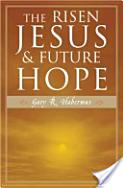What is Deism?
Definition of Terms
Many modern Americans are familiar with the terms Deist or Deism as it relates to the ongoing debate over the religious beliefs of the nation's founders. As products of the Enlightenment, men such as Thomas Jefferson, Thomas Paine, and possibly others, relied heavily upon the ideas of Thomas Hobbes, John Locke, Voltaire, Baron de Montesquieu, and Jean Jacque Rousseau in forming the philosophical foundations of the American form of government. Recent years have seen a massive debate emerge amongst historians over whether George Washington was a Deist or a Christian. Revisionist historians have tried to portray Washington as a card-carrying Deist. In 2006, Peter A. Lillback, wrote a massive book titled, George's Washington's Sacred Fire, in which he seeks to document using Washington's own journals and correspondence as well as other primary sources our first president's deeply rooted Christian faith.
For those unfamiliar with the term, Deism is derived from the Latin word dues which means God. Similarly, theism comes from the Greek word theos which also means God. As the entomology of the word implies, Deism is a form of theism that maintains the belief in a creator God unlike atheism which does not. John Orr, author of English Deism: Its Roots and Its Fruits, outlines the historical connection as well as the point of divergence in how the terms deism and theism have been utilized:
Prior to the 17th century the terms (Deism and Deist) were used interchangeably with the terms "theism" and "theist," respectively . . .Theologians and philosophers of the seventeenth century began to give a different signification to the words. . .Both (theists and deists) asserted belief in on supreme God, the Creator. . . and agreed that God is personal and distinct from the world. But the theist taught that god remained actively interested in and operative in the word which he had made, whereas Deists maintained that God endowed the world at creation with self-sustaining and self-acting powers and then abandoned it to the operation of these powers acting as second causes.
In summary, Deists are theistic in the sense that they believe in a higher power responsible for creation. However, they are not Christian because they deny God's miraculous intervention within the created order.
To ensure accuracy it is important that we correctly define our terms. Webster's 1828 American Dictionary of the English Language offers the following definitions for Deism and Deist:
- Deism: The doctrine or creed of a deist; the belief or system of religious opinions of those who acknowledge the existence of one God, but deny revelation: or deism is the belief in natural religion only, or those truths, in doctrine and practice, which man is to discover by the light of reason, independent and exclusive of any revelation from God. Hence deism implies infidelity or a disbelief in the divine origin of the scriptures.
- Deist: One who believes in the existence of a God, but denies revealed religion, but follows the light of nature and reason, as his only guides in doctrine and practice; a freethinker.
Utilizing the definitions presented above, Peter A. Lillback, offers the following expanded definition of Deism: "a Deist is one who believes that there is a God, but He far removed from the daily affairs of men. God made the world and then left it to run on its own. The Deist's God does not take an active interest in the affairs of men. He is not a prayer-answering God. Praying to Him has no value. Deism is in some ways the natural outworking of the exalting of reason alone—that is, human reason apart from define revelation."
Historical Development
Deistic thinking has existed since antiquity. "Insofar as deism involved a negative destructive criticism of both supernatural revelations and miracles, it springs from the ancient pagan writers like Celsus and Porphyry." Also fitting Deistic conceptions of the divine was the notion of God as the logos or supreme rational principle that governs the universe as taught by Heraclitus. Likewise, Plato described God as the Demiurge or craftsman.
Despite the presence of Deistic ideas in the ancient world, Deism today is best understood as a movement toward natural theology or freethinking that occurred in 17th-century Europe. Before 1500, scholars generally decided what was true or false by referring to an ancient Greek or Roman author or to the Bible. Few European scholars challenged the scientific ideas of the ancient thinkers or the church by carefully observing nature for themselves. The publication of On the Revolutions of the Heavenly Bodies, by Nicolaus Copernicus in 1543, began a slow process of questioning old assumptions about knowledge. Based on his observations of the movement of planetary bodies, Copernicus concluded that the sun was center of our solar system and not the earth. Later, Johannes Kepler and Galileo Galilei used mathematics to prove that the heliocentric theory postulated by Copernicus was correct. Eventually, the work of Copernicus, Kepler, and Galileo developed into a logical procedure for gathering and testing ideas known as the scientific method under the leadership of Francis Bacon.
Building upon the work of his predecessors, Isaac Newton helped bring together their breakthroughs under a singe theory of motion. Newton's discovery of universal gravitation explained the behavior of objects here on earth and in the heavens. The result was a universe that was controlled by the laws of nature. Theologically, a new way of viewing God emerged. God created the universe to be controlled by natural laws and then retired from the scene just as a watchmaker designs his watch to run on its own. Christian apologist Norman Geisler agrees that this is how modern Deistic concepts emerged. Geisler writes, ". . . a philosophical movement, deism borrowed the theist concept of God and understood it in terms of the mechanistic model (e.g. watchmaker) of the new scientific outline springing form Bacon and others." Consequently, as the growing explanatory power of natural law grew, skepticism about the veracity of miracles (i.e. violations of nature law) and books that reported them, such as the Bible increased.
Basic Tenets of Deism
As with any intellectual movement, there is diversity of belief amongst those who historically have identified themselves as Deists. On the other hand, all Deists do share a commonality of belief on a couple key issues. As we have already seen, a Deist is defined as one who believes there is a God beyond the world who created the world but that the world runs by natural law without supernatural interference. According to Geisler, there are three central tenants of a Deistic worldview, to which we now turn our attention.
"The first premise of a Deistic worldview is that there is a God who created the universe." In contrast with atheism, Deists maintain it is necessary to posit a God as the author and architect of the universe because there must be a first cause beyond the natural world who authored all natural processes. Unlike, pantheism which teaches that God is all, Deists maintain that God is separate from his creation. For example, the world is different from God as the painting is from its painter. Just as the painting reflects the nature and attributes of its painter, so too does the creation demonstrate the nature of its designer. In short, Deists view God as eternal, unchangeable, impassable, all-knowing, all-powerful, all-good, true, just, invisible, and infinite. In summary, "there is a God who created, regulates, and sustains the world. And this world is dependent on God, not God on the world."
"The second major premise of deism is antisupernaturalism." Simply stated, miracles do not occur. Many Deists argue that a perfect God would not make an imperfect universe that demanded miraculous intervention or repair. Others assert that God set up the laws of the natural world and he cannot (or, will not) violate the laws he established in the natural world. Therefore, since natural laws are immutable, miracles are inconsistent and impossible within the Deistic worldview. Such an insistence magnifies nature of the perfect Mechanic that he made the machine of nature to run without constant need or repair. "For deists all miracle accounts are the result of human intervention or superstition."
"The third major tenet of Deism is a Unitarian concept of God that involved the denial of the orthodox doctrines of the Trinity and the deity of Christ." This premise is consistent with the first and flows necessarily from the second. "If no supernatural event occurs then assuredly Christ was not a supernatural being and definitely not Deity incarnate." Since a denial of the deity of Christ necessitates one also deny the Trinitarian nature of God, Deism is Unitarian in its view of God.
Being a natural religion, Deism maintains that all revelation as well as religions whose truth claims rely on revelation (Christianity) are spurious. While the three tenets discussed above encapsulate the fundamentals of Deistic thinking they are by no means exhaustive. For example, most Deists hold the following beliefs in some form: the existence of moral law, the good life in accord with natural moral law, and a future life of rewards and punishments.
Degrees of Deism
As with any philosophical or theological paradigm, people vary in how far they are willing to go in the application of their models' fundamental ideas. According to Peter A. Lillback, there is a difference between hard and soft Deists. Lillback suggests that a Hard Deist not only rejects God's revelation through Scripture but also denies that God acts in history at all. Consequently, Hard Deists reject the notion of God's hearing and answering of prayers. In contrast, Soft Deists believe in prayer and providence but deny the Bible as a revelation from God.
Rather than disguising between Hard and Soft Deists, Norman Geisler recognizes four distinct forms of Deism that center around God's concern for the world and the existence of an afterlife for human beings. These four types of Deism include: The God of No Concern, The God of No Moral Concern, The God of Moral Concern for This Life, and The God of Moral Concern for This Life and the Next.
- The God of No Concern: The first type of Deism was largely of French origin. According to this view, God is not concerned with governing the world he made. He created the world and set it in motion, but has no regard for what happens to it after that.
- The God of No Moral Concern: In this second form of Deism, God is concerned with the ongoing happenings of the world but not with the moral actions of human being. Man can act rightly or wrongly, righteously or wickedly, morally or immorally. It is of no concern to God.
- The God of Moral Concern for This Life: The third type of Deism maintains that God governs the world and does care about the moral activity of human beings. Indeed, God insists on obedience to the moral law that God established in nature. However, there is no future after death.
- The God of Moral Concern to This Life and the Next: The fourth type of Deism contends that God regulates the world, expects obedience to the moral law grounded in nature, and has arranged for a life after death, with rewards for the good and punishments for the wicked. This view was common among both English and American Deists.
Conclusion
While modern Deistic groups still exist, even this theistic view waned in popularity under the force of Darwinian evolution. Now that we have identified the basic teachings of the Pure Grace position and defined the basic tenets of Deism we can direct our attention next week toward answering our fundamental question—are Grace Lifers Deists?

























